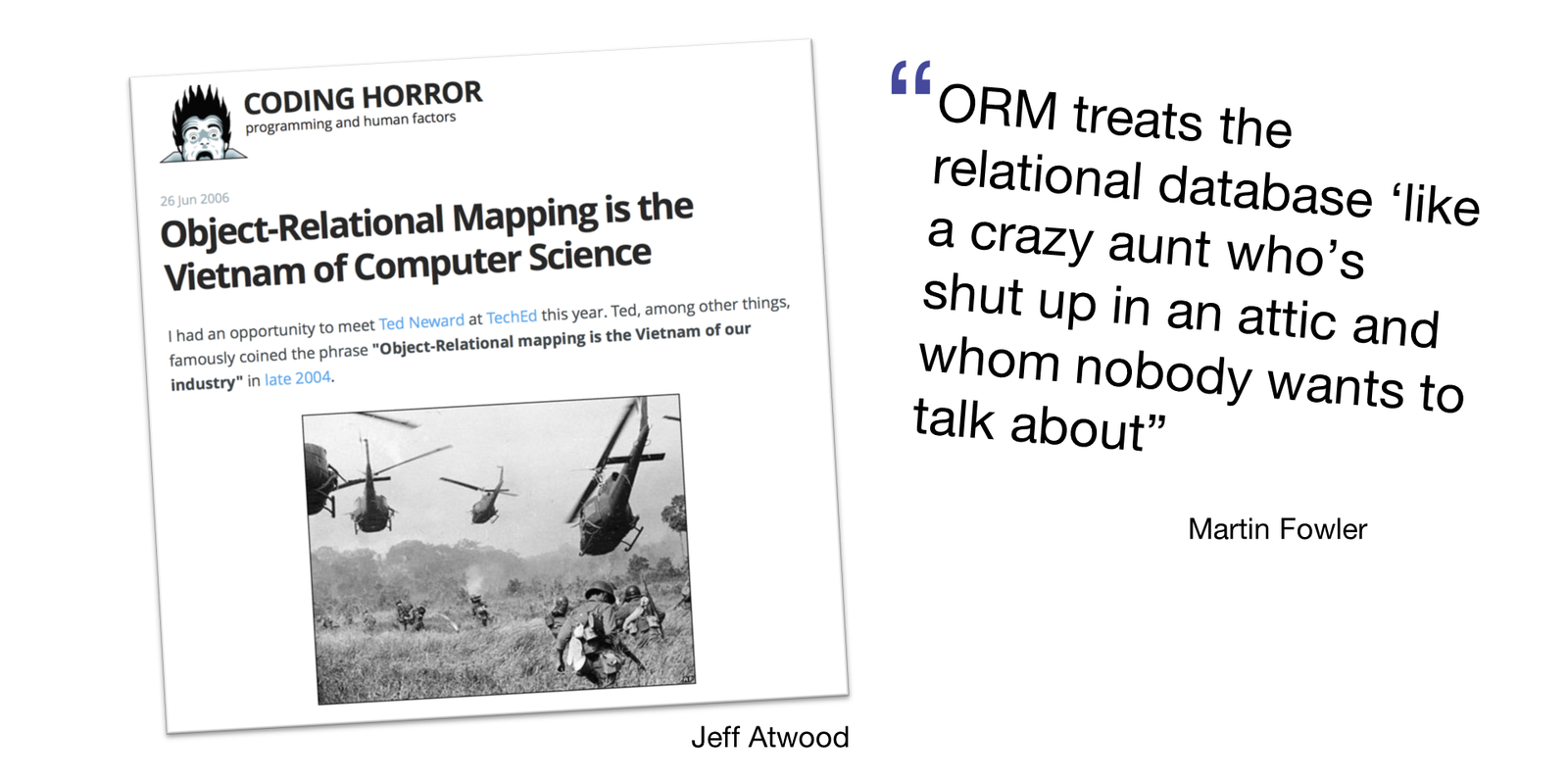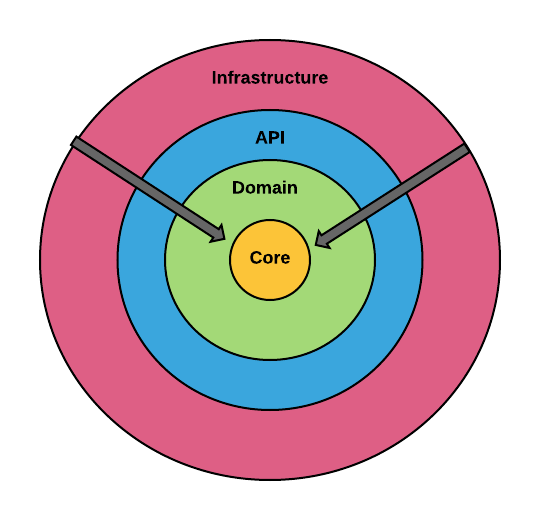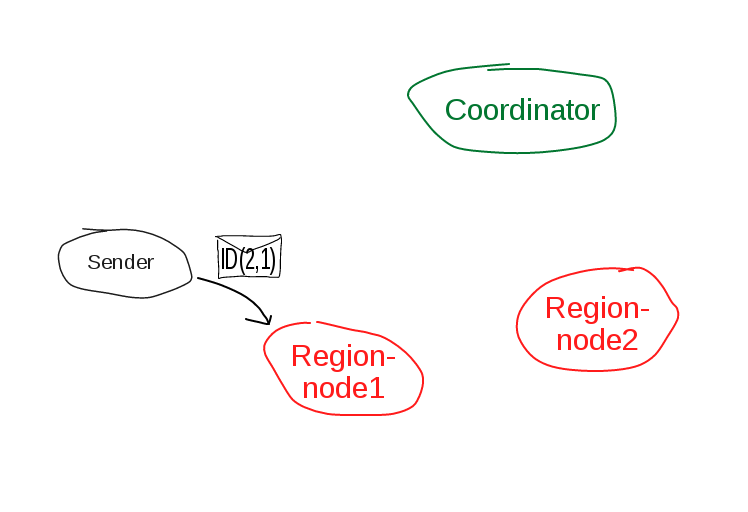


Repository
Preso
What is Slick?
Not an ORM
ORM problems
N+1 problem (lazy / eager fetching)
Session context scope
Execution under the cover (cache)
O-R impedance mismatch
False promise
Leaky abstraction

FRM
Embrace database model through a functional paradigm.
Type-Safe
Reactive (™?)
...wait a minute, JDBC is blocking anyway
Everything is async...
db_pool_connections =
(core_count * 2) + effective_spindle_count
source: postgres docs
Brilliant presentation by @StefanZeiger: Reactive Slick for Database Programming
Server handling 10 000 client connections may need not more than 10 connection
It's still viable
If you were to remember only one thing
Monadic Trio
DBIO
Query
description of a DB query
description of 1...N DB operations
Future
well... you know
Tables

// in-application respresentation of table's tuple
case class University(name: String,
id: Long = -1L)
// definition of table
class UniversityTable(tag: Tag) extends Table[University](
tag, "university") {
def name = column[String]("name")
def id = column[Long]("id", O.PrimaryKey, O.AutoInc)
// default projection
def * = (name, id) <> (University.tupled,
University.unapply)
}
// 'table' object used for interacting with in app
lazy val UniversityTable = TableQuery[UniversityTable]Actions
Monadic Trio
val futureResults = memDb.run(
UniversityTable
.filter(_.name === "Hogwarth") // Query
.result // DBIOAction (DBIO)
) // Future// futureResults is of type
// Future[Seq[University]]
futureResults.onComplete {
case Success(unis) =>
for (uni <- unis) println(uni)
case Failure(e) =>
e.printStackTrace()
}DBIOAction / DBIO
DBIOAction[R, S, E]
R - type of result
S - streaming / not streaming
E - what kind of effect
DBIO[R] =
DBIOAction[R, NoStream, Effect.All]
R - type of result
def executeReadOnly[R, S <: dbio.NoStream](
readOnlyOper: DBIOAction[R, S, Effect.Read] // param decl
): Future[Unit] = { // result type
db.run(readOnlyOper).map { results =>
log.info(s"Results are: $results")
}
}// this works
executeReadOnly(UniversityTable.result)// this won't even compile
executeReadOnly(UniversityTable += University("Nice try!"))// DBIOAction[Seq[University], Stream, Effect.Read]
db.run(
UniversityTable.result
)
...
// DBIOAction[Option[Int], NoStream, Effect.Write]
db.run(
UniversityTable += University("California")
)
...
// DBIOAction[Option[Int], NoStream,
// Effect.Write with Effect.Transactional]
db.run(
DBIO.seq(
UniversityTable += University("Massachusetts"),
UniversityTable += University("California")
).transactionally
)
...
// DBIOAction[Unit, NoStream, Effect.Schema]
db.run(
UniversityTable.schema.create
)Queries
Query
Query[M, U, C]
M - mixed type
U - unpacked type
C - collection type

UniversityTable
.filter(_.name === "Hogwarth")What are unpacked (U), mixed (M) and collection (C) types?
UniversityTable
.filter(_.name === "Hogwarth")
// _ above is UniverityTable (M)
// unpacked type
case class University(name: String,
id: Long = -1L)
// mixed type
class UniversityTable(tag: Tag) extends Table[University](
tag, "university") {
def name = column[String]("name")
def id = column[Long]("id", O.PrimaryKey, O.AutoInc)
// default projection
def * = (name, id) <> (University.tupled,
University.unapply)
}
db.run( // Future[Seq[University]]
UniversityTable.filter(uni => // Query[UniversityTable,
// University, Seq]
uni.name === "Hogwarth"
)
.result // DBIO[Seq[University]]
)
Do you speak it?!
Queries
select "NAME",
"MIDDLE_NAME",
"SURNAME",
"NATIONALITY",
"ID"
from "STUDENT"
StudentTable
// or
for {student <- StudentTable }
yield student
StudentTable
.map(_.name)
select "NAME"
from "STUDENT" StudentTable
.filterNot(student =>
student.name === "Tom" &&
student.surname.startsWith("Smi")
)
// or
for {
student <- StudentTable if !(
student.name === "Tom" &&
student.surname.startsWith("Smi"))
} yield student
select "NAME",
"MIDDLE_NAME",
"SURNAME",
"NATIONALITY",
"ID"
from "STUDENT"
where not (("NAME" = 'Tom') and
("SURNAME" like 'Smi%' escape '^'))
StudentTable
.filter(student => student.middleName.nonEmpty)
.sortBy(s => (s.name.desc, s.middleName.asc))
.distinct
select distinct "NAME", ...
from "STUDENT"
where "MIDDLE_NAME" is not null
order by "NAME" desc, "MIDDLE_NAME"
StudentTable
.map(s => (s.name, s.surname))
.take(3)
.drop(2)
select ...
from "STUDENT"
limit 1 offset 3Joins
Monadic
vs
applicative
// student course segment
case class StudentCourseSegment(studentId: Long,
courseId: Long,
semesterId: Long,
id: Long)
class StudentCourseSegmentTable(tag: Tag) extends
Table[StudentCourseSegment](tag, "STUDENT_COURSE_SEGMENT") {
def studentId = column[Long]("STUDENT_ID")
def courseId = column[Long]("COURSE_ID")
def semesterId = column[Long]("SEMESTER_ID")
def id = column[Long]("ID", O.PrimaryKey, O.AutoInc)
def * = (studentId, courseId, semesterId, id) <> (StudentCourseSegment.tupled,
StudentCourseSegment.unapply)
// foreign keys
def student = foreignKey("fk_segment_student", studentId, StudentTable)(_.id)
def course = foreignKey("fk_segment_course", courseId, CourseTable)(_.id)
def semester = foreignKey("fk_segment_semester", semesterId, SemesterTable)(_.id)
}
lazy val StudentCourseSegmentTable = TableQuery[StudentCourseSegmentTable]
def student =
foreignKey("fk_segment_student",
studentId, StudentTable)(_.id)
def course =
foreignKey("fk_segment_course",
courseId, CourseTable)(_.id)
def semester =
foreignKey("fk_segment_semester",
semesterId, SemesterTable)(_.id)db.run((
for {
segment <- StudentCourseSegmentTable
course <- segment.course // foreign key
student <- segment.student // foreign key
} yield (course, student)
)db.run(
StudentCourseSegmentTable
join CourseTable on (_.courseId === _.id)
join StudentTable on (_._1.studentId === _.id)
).map {
case ((segment, course), student) =>
(course, student)
}
)Monadic
Applicative
More complicated join
Applicative vs monadic
StudentCourseSegmentTable
.join(StudentTable)
.on { case (segment, student) =>
student.id === segment.studentId }
.join(CourseTable)
.on { case ((segment, _), course) =>
course.id === segment.courseId }
.join(SemesterTable)
.on { case (((segment, _), _), semester) =>
semester.id === segment.semesterId }
.filter { case (((_, student), _), _) =>
student.name === "Tim"
} select x2."NAME",
...
from "STUDENT_COURSE_SEGMENT" x2,
"STUDENT" x3,
"COURSE" x4,
"SEMESTER" x5
where (x3."NAME" = 'Tim') and
(((x3."ID" = x2."STUDENT_ID") and
(x4."ID" = x2."COURSE_ID")) and
(x5."ID" = x2."SEMESTER_ID")) for {
segment <- StudentCourseSegmentTable
student <- segment.student if student.name === "Tim"
course <- segment.course
semester <- segment.semester
} yield (segment, student, course, semester) select x2."NAME",
...
from "STUDENT_COURSE_SEGMENT" x2,
"STUDENT" x3,
"COURSE" x4,
"SEMESTER" x5
where (x3."NAME" = 'Tim') and
(((x3."ID" = x2."STUDENT_ID") and
(x4."ID" = x2."COURSE_ID")) and
(x5."ID" = x2."SEMESTER_ID"))Sometimes one form is more elegant than the other
Outer joins
DocumentTable
.joinLeft(StudentTable).on(_.studentId === _.id)
.filter { case(doc, student) =>
student.map(_.name) === "Tom"
} select x2."STUDENT_ID", ..., x3."ID", ...
from "DOCUMENT" x2
left outer join "STUDENT" x3
on x2."STUDENT_ID" = x3."ID"
where x3."NAME" = 'Tom'Composition / Transactions
DBIO.transactionally
db.run(
(UniversityTable ++= Seq(
University("Hogwart"),
University("Scala University")
)).transactionally
)Transactions - example
OK, but how do we combine DB operations?
DBIO is a monad

db.run(
(for {
dbio1 <- insertUnis
dbio2 <- ...
dbio3 <- ...
...
dbioN <- ...
} yield {
...
}).transactionally
)def insertUnis: DBIO[Option[Int]] =
UniversityTable ++= Seq(
University("Hogwart"),
University("Scala University")
)map / flatMap
sequence
val combined: DBIO[Seq[T]] = DBIO.sequence(
Seq(
produceDbOper1, // DBIO[T]
produceDbOper2, // DBIO[T]
produceDbOper3 // DBIO[T]
)
) db.run( // Future[Seq[Seq[Course]]]
for {
students <- StudentTable.result
courses <- DBIO.sequence(students.map(fetchMoreData))
} yield {
courses
}
)
...
private def fetchMoreData(student: Student):
DBIO[Seq[Course]] = {
(for {
segment <- StudentCourseSegmentTable
if segment.studentId === student.id
course <- segment.course
} yield {
course
}).result
}
def execTransact[T](dbio: DBIO[T]): Future[T] =
db.run(dbio.transactionally)Combine operations & fire within transtion
Summary
Future / DBIO / Query
Slick is not ORM
DBIO composition
Think in terms of Collection API
The Slick profiles (previously called “drivers”) for DB2, Oracle and SQL Server are now part of the core open source release. There is no separate Slick Extensions release anymore.
Important change in 3.2
Resources
Slick docs: http://slick.lightbend.com/docs/
Online workshop by Dave Gurnell: https://vimeo.com/148074461
Excelent book: http://underscore.io/books/essential-slick/
Unicorn
Slick with a little bit of magic

https://github.com/liosedhel/play-slick-unicorn-example
Agenda
- Unicorn features
- Typesafe ID
- Generic DAO
- Structuring your application
- Table composition
- Implementing repository
- Extracting the repository interface
- Domain services with the repository
Unicorn's magic

Join problem
GamesTable.join(UsersTable).on(_.placeId === _.id)Wrong!
Typesafe ID
import org.virtuslab.unicorn._
case class UserId(id: Long)
extends BaseId[Long]
case class UserRow(
id: Option[UserId],
email: String,
firstName: String,
lastName: String
) extends WithId[Long, UserId] IdTable
class UsersTable(tag: Tag)
extends IdTable[UserId, UserRow](tag, "users") {
def email = column[String]("email")
def firstName = column[String]("first_name")
def lastName = column[String]("last_name")
override def * =
(id.?, email, firstName, lastName)
<>
(UserRow.tupled, UserRow.unapply)
}
val UsersTable = TableQuery[UsersTable]Join problem
GamesTable.join(UsersTable).on(_.placeId === _.id)Compilation Error - Cannot perform option-mapped operation
Database Access Object
class UsersDao
extends BaseIdRepository[
UserId, UserRow, UsersTable
](UsersTable)
//methods you get for free
def findById(id: Id): DBIO[Option[Entity]]
def findExistingById(id: Id): DBIO[Entity]
def findByIds(ids: Seq[Id]): DBIO[Seq[Entity]]
def deleteById(id: Id): DBIO[Int]
def save(elem: Entity): DBIO[Id]
def saveAll(elems: Seq[Entity]): DBIO[Seq[Id]]
//... and more
JunctionTable
class GamesUsers(tag: Tag)
extends JunctionTable[GameId, UserId](tag, "games_users") {
def gameId = column[GameId]("game_id")
def userId = column[UserId]("user_id")
def game = foreignKey("game_fk", gameId, GamesTable)(_.id)
def user = foreignKey("user_fk", userId, UsersTable)(_.id)
def pk = primaryKey("games_users_pk", (gameId, userId))
override def columns = gameId -> userId
}
val GamesUsersTable = TableQuery[GamesUsers]
class GamesUsersDao
extends JunctionRepository[GameId, UserId, GamesUsers](
GamesUsersTable
)Structuring your application

Standard architecture

Onion architecture

https://dzone.com/articles/onion-architecture-is-interesting
Architecture view


Repository Component


BaseRepositoryComponent
import org.virtuslab.unicorn._
trait UserBaseRepositoryComponent {
protected val unicorn: Unicorn[Long] with HasJdbcDriver
import unicorn._
import unicorn.driver.api._
class UsersTable(tag: Tag) extends IdTable ...
val UsersTable = TableQuery[UsersTable]
class UsersDao extends BaseIdRepository ...
}Compose components
trait GamesBaseRepositoryComponent
extends UsersBaseRepositoryComponent {
import unicorn._
import unicorn.driver.api._
class Games(tag: Tag)
extends IdTable[GameId, GameRow](tag, "games"){
def organizerId = column[UserId]("organizer_id")
def organizer =
foreignKey("organizer_fk", organizerId, UsersTable)(_.id)
...
override def * = ...
}
}Repository

Repository Implementation
@Singleton
class UsersRepositoryJdbc
@Inject() (val unicorn: UnicornPlay[Long])
(implicit ec: ExecutionContext)
extends UsersBaseRepositoryComponent
with UserRepository[DBIO]
with DbioMonadImplicits{
val usersDao = new UsersDao
def findByUserId(userId: UserId): OptionT[DBIO, User] = {
OptionT(usersDao.findById(userId))
.map(toDomain)
}
def toDomain(userRow: UserRow): User = {
import userRow._
User(userRow.id, firstName)
}
}"Complicated" domain object
def toDomain(gameRow: GameRow): OptionT[DBIO, Game] = {
for {
organizer <- usersRepository
.findByUserId(gameRow.organizerId)
place <- placeRepository
.findByPlaceId(gameRow.placeId)
} yield Game(
gameRow.id,
organizer,
gameRow.note,
gameRow.date,
place
)
}Transactions
import unicorn.driver.api._
def doTransactionalOperations(gameId1: GameId,
gameId2: GameId) = Action.async {
unicorn.db.run{
DBIO.seq(
gameRepository.deleteGame(gameId1),
gameRepository.deleteGame(gameId2)
).transactionally
}.map(_ => Ok)
}Repository Interface

Repository Interface
trait UserRepository[F[_]] {
def findByUserId(userId: UserId): OptionT[F, User]
}
Get rid of DBIO from domain!
Domain Service

Domain Service
@Singleton
class StatisticsService[F[_]: Monad] @Inject()(
gamesUsersRepository: GamesUsersRepository[F]
) {
def rootMeanSquareOfPlayersPerGame(): F[Double] = {
for {
gamesAndParticipants <-
gamesUsersRepository.findGamesAndParticipantsNumber()
} yield {
val numberOfGames = gamesAndParticipants.size
val nominator = gamesAndParticipants
.map{case (_, p) => p * p}.sum
if(numberOfGames <= 0)
0
else
Math.sqrt(nominator / numberOfGames)
}
}
}
Noel Markham - A purely functional approach to building large applications www.youtube.com/watch?v=V1d3OYYez7s
Testing domain service
"Statistics service" should
"compute mean square number of players per game" in {
Given("statistic service with repository mock")
val gamesUsersRepositoryMock =
mock[GamesUsersRepository[Id]]
val statisticService =
new StatisticsService(gamesUsersRepositoryMock)
val gamesAndParticipants =
Seq((GameId(1), 2), (GameId(2), 2))
(gamesUsersRepositoryMock.findGamesAndParticipantsNumber _)
.expects().returning(gamesAndParticipants)
When("calculating the root mean square")
val averageNumberOfPlayersPerGame =
statisticService.rootMeanSquareOfPlayersPerGame()
Then("average must be calculated properly")
averageNumberOfPlayersPerGame shouldBe 2
}
Unicorn and cat(s)

Cool toolz in the Scalaz and Cats toolboxes by Jan Pustelnik, Scalar Conf 2016
Async controller
@Singleton
class AsyncController @Inject()(
unicorn: UnicornPlay[Long],
statisticsService: StatisticsService[DBIO]
)(implicit exec: ExecutionContext) extends Controller {
def averageNumberOfPlayersPerGame() = Action.async{
unicorn.db.run {
statisticsService.averageNumberOfPlayersPerGame()
}.map(average => Ok(Json.toJson(average)))
}
}
//GUICE
bind(new TypeLiteral[UnicornPlay[Long]](){})
.to(classOf[LongUnicornPlayJdbc])
bind(new TypeLiteral[GamesUsersRepository[DBIO]](){})
.to(classOf[GamesUsersRepositoryJdbc])General trick and tips
- Make a good use of DBIO monad
- Be familiar with cats or scalaz libraries
- Do not couple your domain with DBIO, Future - they are just monads
- Separate infrastructure from domain (try onion architecture idea)
Questions?

Bonus

for {
segment <- StudentCourseSegmentTable
student <- segment.student if student.name === "Tim"
course <- segment.course
semester <- segment.semester
} yield (segment, student, course, semester)
DEBUG s.c.QueryCompilerBenchmark - ------------------- Phase: Time ---------
DEBUG s.c.QueryCompilerBenchmark - assignUniqueSymbols: 0.446286 ms
DEBUG s.c.QueryCompilerBenchmark - inferTypes: 0.239283 ms
DEBUG s.c.QueryCompilerBenchmark - expandTables: 0.984031 ms
DEBUG s.c.QueryCompilerBenchmark - forceOuterBinds: 1.048910 ms
DEBUG s.c.QueryCompilerBenchmark - removeMappedTypes: 0.536035 ms
DEBUG s.c.QueryCompilerBenchmark - expandSums: 0.016068 ms
DEBUG s.c.QueryCompilerBenchmark - emulateOuterJoins: 0.108066 ms
DEBUG s.c.QueryCompilerBenchmark - expandRecords: 0.421471 ms
DEBUG s.c.QueryCompilerBenchmark - flattenProjections: 2.212847 ms
DEBUG s.c.QueryCompilerBenchmark - rewriteJoins: 2.219579 ms
DEBUG s.c.QueryCompilerBenchmark - verifySymbols: 0.204175 ms
DEBUG s.c.QueryCompilerBenchmark - relabelUnions: 0.086386 ms
DEBUG s.c.QueryCompilerBenchmark - createAggregates: 0.013349 ms
DEBUG s.c.QueryCompilerBenchmark - resolveZipJoins: 0.126179 ms
DEBUG s.c.QueryCompilerBenchmark - pruneProjections: 0.567347 ms
DEBUG s.c.QueryCompilerBenchmark - rewriteDistinct: 0.018858 ms
DEBUG s.c.QueryCompilerBenchmark - createResultSetMapping: 0.274411 ms
DEBUG s.c.QueryCompilerBenchmark - hoistClientOps: 0.649790 ms
DEBUG s.c.QueryCompilerBenchmark - reorderOperations: 0.643005 ms
DEBUG s.c.QueryCompilerBenchmark - mergeToComprehensions: 4.482695 ms
DEBUG s.c.QueryCompilerBenchmark - optimizeScalar: 0.179255 ms
DEBUG s.c.QueryCompilerBenchmark - removeFieldNames: 1.145481 ms
DEBUG s.c.QueryCompilerBenchmark - codeGen: 3.783455 ms
DEBUG s.c.QueryCompilerBenchmark - TOTAL: 20.406962 ms
val query = Compiled { name: Rep[String] =>
for {
segment <- StudentCourseSegmentTable
student <- segment.student if student.name === name
course <- segment.course
semester <- segment.semester
} yield (segment, student, course, semester)
}
...
...
db.run(query("Tim").result)Precompilation
Property age = Property.forName("age");
List cats = sess.createCriteria(Cat.class)
.add( Restrictions.disjunction()
.add( age.isNull() )
.add( age.eq( new Integer(0) ) )
.add( age.eq( new Integer(1) ) )
.add( age.eq( new Integer(2) ) )
) )
.add( Property.forName("name").in(
new String[] { "Fritz", "Izi", "Pk" } )
)
.list();Criteria API?
StudentTable.filter(row: StudentTable => ...)Criteria API?
StudentTable.filter(myExtractedFilter)
def myExtractedFilter(row: StudentTable): Rep[Boolean] = {
row.name === "Tom" && row.nationality === "American"
}
StudentTable
.map(s => (s.name, s.surname))
.distinctOn(_._1)
select "NAME", min("SURNAME")
from "STUDENT"
group by "NAME"
StudentTable
.filter(_.surname =!= "Test")
.groupBy(_.surname)
.map { case (surname, group) =>
(surname, group.map(_.name).countDistinct)
}
.filter(row => row._2 > 5)
select "SURNAME", count(distinct "NAME")
from "STUDENT"
where not ("SURNAME" = 'Test')
group by "SURNAME"
having count(distinct "NAME") > 5